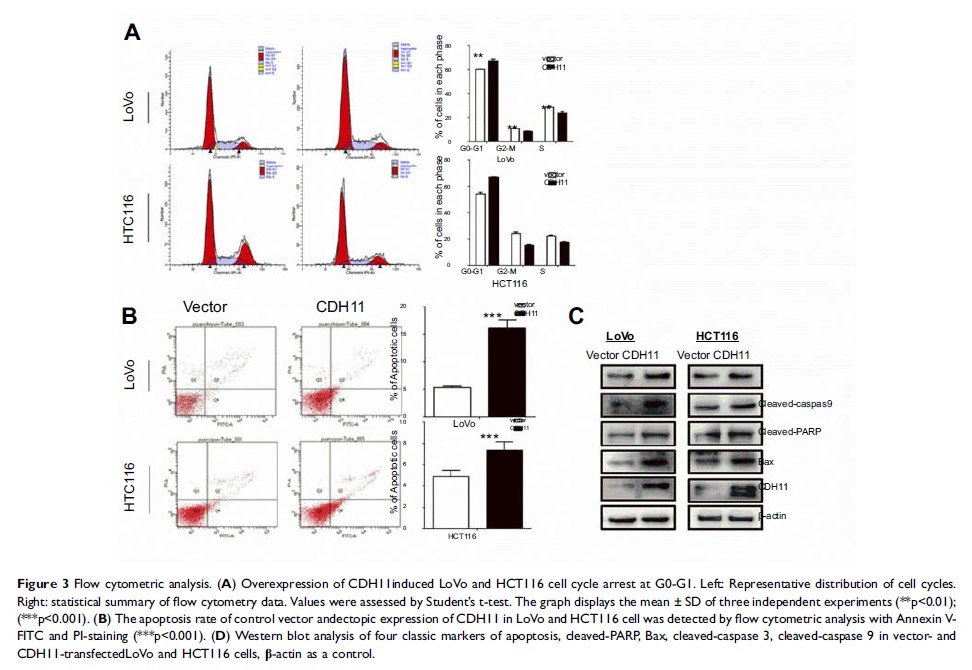9 9 6 5 3
论文已发表
注册即可获取德孚的最新动态
IF 收录期刊
- 3.3 Breast Cancer (Dove Med Press)
- 3.4 Clin Epidemiol
- 2.5 Cancer Manag Res
- 2.9 Infect Drug Resist
- 3.5 Clin Interv Aging
- 4.7 Drug Des Dev Ther
- 2.7 Int J Chronic Obstr
- 6.6 Int J Nanomed
- 2.5 Int J Women's Health
- 2.5 Neuropsych Dis Treat
- 2.7 OncoTargets Ther
- 2.0 Patient Prefer Adher
- 2.3 Ther Clin Risk Manag
- 2.5 J Pain Res
- 2.8 Diabet Metab Synd Ob
- 2.8 Psychol Res Behav Ma
- 3.0 Nat Sci Sleep
- 1.8 Pharmgenomics Pers Med
- 2.7 Risk Manag Healthc Policy
- 4.2 J Inflamm Res
- 2.1 Int J Gen Med
- 4.2 J Hepatocell Carcinoma
- 3.7 J Asthma Allergy
- 1.9 Clin Cosmet Investig Dermatol
- 2.7 J Multidiscip Healthc

钙粘蛋白-11 由于启动子甲基化而失活,并在结直肠癌中发挥肿瘤抑制因子的作用
Authors Yuan S, Li L, Xiang S, Jia H, Luo T
Received 12 November 2018
Accepted for publication 28 February 2019
Published 28 March 2019 Volume 2019:11 Pages 2517—2529
DOI https://doi.org/10.2147/CMAR.S193921
Checked for plagiarism Yes
Review by Single-blind
Peer reviewers approved by Dr Amy Norman
Peer reviewer comments 2
Editor who approved publication: Dr Beicheng Sun
Background: The cadherin-11 (CDH11 , OB-cadherin)
gene is a member of the cadherin family and is located on chromosome 16q22.1.
Previous studies have revealed that cadherins play significant roles in the
development of many human malignancies. Increasing evidence has
identified CDH11 as
a functional tumour suppressor, which is commonly silenced by promoter
methylation, but the functions of this gene in colorectal cancer (CRC) have
been unclear.
Methods: The CDH11 expression
in primary CRC tissues and cell lines was investigated by qRT-PCR, RT-PCR and
immunohistochemistry. The promoter methylation status of CDH11 was
measured by methylation-specific PCR (MSP). Cell proliferation assay, colony
formation assay, flow cytometry analysis, wound-healing assay, transwell assay
and in vivo experiments were used to investigate the function of CDH11 in CRC.
The mechanisms of CDH11 also were explored by western blots.
Results: Our study
suggests that CDH11 downregulation in CRC due to its promoter
methylation and induced cell cycle arrest in G0/G1 phase and apoptosis,
suppressing tumor cell proliferation, colony formation, migration and invasion
by affecting the NF-kB signaling pathway.
Conclusion: Overall, CDH11 may be
considered as a functional tumour suppressor gene (TSG) in CRC, CDH11 has the
potential to serve as a valuable prognostic marker for colorectal cancer.
Keywords: cadherin
11, colorectal cancer, methylation, NF-kB, tumour suppressor
